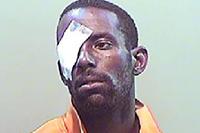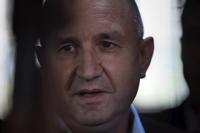DETROIT (AP) — DeAngelo Martin killed four women and raped two others over a 16-month span before he was captured.
Only now, a year after , is it clear that police failed repeatedly to follow up on leads or take investigative steps that may have averted the killing spree, despite receiving repeated warnings that Martin was a violent predator, an Associated Press investigation has found.
The AP found myriad failures.
Some of the key takeaways from its investigation:
Killings put Detroit on edge
Martin, 38, lured four women in 2018 and 2019 into vacant homes and murdered them, leaving their nude or partially clothed corpses amid cheap booze pints, crumbling walls and hypodermic needles.
The killings rattled Detroit, on overtime to scour thousands of abandoned houses for more bodies. Police caught Martin in June 2019. He pleaded guilty in 2022 to killing four women — Annetta Nelson, 57; Nancy Harrison, 52; Trevesene Ellis, 58; Tamara Jones, 55 — and raping two others. He was sentenced last year to serve between 45 years and 70 years in prison.
DNA linked Martin to past assaults
Martin was first linked to sexual violence in 2012. That's when the state crime lab connected him to a sexual assault that occurred eight years earlier.
The victim, a 41-year-old woman, told police that she had been raped at gunpoint; investigators collected evidence in a rape kit. In 2009, prosecutors in a dilapidated warehouse, sparking a push by Wayne County prosecutors to clear the backlog.
In 2016, records show, police got around to reinvestigating the assault. Police determined that the victim had died shortly after the crime. Without a living victim, they closed the case.
The state lab next linked Martin’s DNA to another sexual assault that was reported in late 2015. Police noted in their report that the woman had suffered injuries consistent with an assault: “two black swollen eyes” and swollen lips, as well as bruises on her legs and scratches on her neck.
Prosecutors were alarmed. In a 2016 email to police, assistant prosecutor Tanya Abdelnour told sex crimes investigators that “clearly a second hit to (a rape kit) is an indication of a possible serial offender.”
“It appears that that assault included some physical violence to the victim resulting in injuries,” she wrote. “It is concerning that the physical violence is increasing.”
Police did not get very far. The victim declined to cooperate, records show, and the investigation was closed.
The next year, the crime lab linked Martin’s DNA to a third rape kit. That specimen had been submitted by a hospital, but police could find no record of the victim having reported the crime.
Martin escalated to murder
Martin’s first known murder victim was found in 2018, though police initially arrested the wrong man.
Two Detroit police officers were on patrol one February afternoon when they were flagged down by a 43-year-old vagabond. Next to him, the police saw a dead, naked woman sprawled on the street. The woman was Nelson, 57, and she had been slain in a nearby vacant home and dragged by the homeless man into the street so she might be discovered. Authorities charged the homeless man with murder, only to drop the case a week later citing video evidence that cleared him.
DNA testing, completed in May 2018, linked the crime to Martin.
Police officials told the AP that they sought to find Martin. But they did not seek a warrant to obtain his DNA to confirm the hit. Experts said that was a mistake. In the months after the DNA hit, Martin had repeated unrelated contact with Detroit-area police officers.
Detroit police also didn't check with other area law enforcement agencies. Martin was given a ticket for disorderly conduct by Wayne State University police in September. He was arrested that same month in Ferndale on charges of lying about his identity.
Martin was arrested again in December 2018 for hitting a girlfriend in the face in Southfield, another suburb. He pleaded guilty to a misdemeanor assault charge and spent about two weeks in the Oakland County jail. Another jail stint followed when he violated the terms of his probation in that case.
Authorities in those jurisdictions did not alert Detroit police to their encounters with Martin. That’s because Detroit police never asked them to be on the lookout for a murder suspect, records show.
Police delayed arresting Martin on rape charge
His second victim, Harrison, was discovered in a vacant home in March 2019. In May, police were dispatched to the home of Martin’s grandmother where a 26-year-old woman reported that Martin had stabbed her and raped her in the basement.
An aunt, Linda Martin, corroborated the woman’s account, telling police that she heard screaming from the basement.
Police did not seek charges in that assault until after the bodies of Martin’s third and fourth known victims were discovered a few weeks later.
Families are furious
Family members of the victims were irate upon learning about the police failures. Relatives of Jones said the 55-year-old Detroit woman would still be alive if police officers had done their jobs.
“She didn't deserve to die this way, and she shouldn't have died at all,” said Tina Taylor, Jones' niece. “She was just a lovely person. She never forgot a birthday.”
Harrison’s father, Gary Harrison, said he generally supports police “but they messed up.”
“They missed the ball really early in this,” he said. “Nancy might still be alive.”
Police concede “mistakes” were made
Detroit police acknowledged they could have better investigated Martin. An internal affairs report, obtained by the AP, found that said that no errors rose “to the level of criminality" but several officers had “neglected their duties.” Two officers were briefly suspended. An internal affairs supervisor summed it up as a “total systemic breakdown.”
Police Commander Michael McGinnis, who led the homicide unit, said he wished his department had made a “more aggressive apprehension effort” after the first murder in 2018. He said the internal investigation contributed to major changes at the department when dealing with crime victims and managing DNA leads from the state police lab.
“We learn from our mistakes and we resolve to do better," said McGinnis, who now leads the Detroit police professional standards bureau. "There is one person who’s responsible for their loss, and that’s DeAngelo Martin. I can’t bring their loved one back. I at least know that he’s been held accountable.”
___
Peek reported on this story while a student in the Howard Center for Investigative Journalism at the University of Maryland. Associated Press writer Mike Householder in Detroit contributed to this report.
Contact AP’s global investigative team at Investigative@ap.org.










































